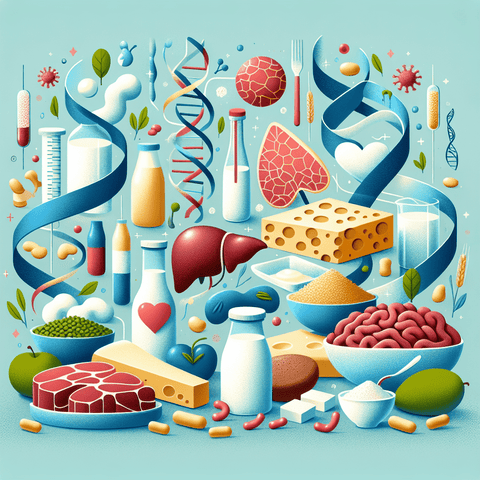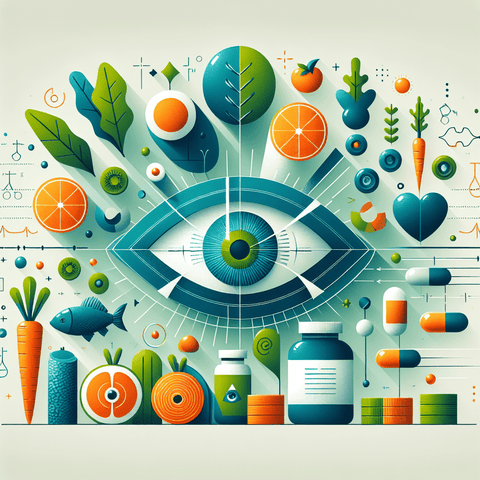Understanding Vitamin B12 in Nutritional Supplements: An Essential Nutrient for Your Health
Vitamin B12, or cobalamin, is an essential water-soluble vitamin that plays a critical role in maintaining optimal health. It is vital for DNA synthesis, red blood cell production, neurological function, and energy metabolism. Unlike most vitamins, B12 contains cobalt, which is central to its biological activity. The human body cannot produce B12 on its own, which means it must be obtained from dietary sources or fortified foods, and in many cases, through supplements. The importance of vitamin B12 is underscored by its numerous physiological functions. One of the key roles of B12 is in the formation of red blood cells. A deficiency in B12 can lead to megaloblastic anemia, characterized by large and poorly formed red blood cells that cannot transport oxygen effectively. This condition often results in fatigue, weakness, and pallor. In terms of neurological health, B12 is necessary for the maintenance of the myelin sheath, a protective coating around nerves. Without adequate B12, individuals may suffer from nerve damage, tingling sensations, mood disturbances, and memory loss over time. Furthermore, vitamin B12 plays an integral part in energy production by aiding in the conversion of carbohydrates into glucose, which the body then uses as fuel. As such, insufficient B12 levels may contribute to decreased endurance, lack of motivation, and general feelings of exhaustion. These energy-depleting symptoms often appear gradually, making B12 deficiency hard to detect unless specifically tested. Certain populations are more at risk for B12 deficiency due to dietary restrictions or malabsorption issues. Older adults, individuals with pernicious anemia, those with gastrointestinal conditions such as Crohn’s disease and celiac disease, and people who have undergone bariatric surgery often struggle with B12 absorption. Moreover, vegans and vegetarians are particularly vulnerable because most natural B12 sources are found in animal-derived foods. That's where vitamin B12 supplements come in. Nutritional supplements help bridge the gap between dietary intake and physiological needs, especially when natural sources are not sufficient or accessible. At Topvitamine.com, you can find a range of trusted B12 products to support your individual health requirements in various forms including tablets, sprays, and sublingual formulations. Understanding the importance of vitamin B12 and recognizing the signs of deficiency are vital first steps in maintaining energy, vitality, and overall health. As we explore further, we’ll look at both natural and fortified sources of this essential vitamin, with focused insights for omnivores, vegetarians, and vegans alike.Plant-Based Sources of Vitamin B12: Can Vegans and Vegetarians Meet Their Needs Naturally?
For vegans and vegetarians, maintaining adequate levels of vitamin B12 can pose a significant challenge. Unlike many other essential nutrients, B12 is almost exclusively found in animal-derived foods. Plants do not require or synthesize B12, which means individuals following plant-based diets must be particularly mindful of their intake through fortified foods or nutritional supplements. Although some plant-based sources are touted as B12-rich, scientific studies have shown that not all are reliable. For instance, fermented foods like tempeh or naturally occurring bacteria in the soil theoretically offer trace amounts of B12, but the forms found are often analogs (pseudo B12) that are biologically inactive in humans. Similarly, products such as spirulina, chlorella, and nori seaweed have gathered attention, with nori being slightly more promising; however, content varies widely, and absorption is inconsistent. Thus, these should not be relied on as primary B12 sources. The most dependable plant-based sources of vitamin B12 are fortified foods. These foods have B12 added during processing, making them a reliable option for those who avoid animal products. Common fortified foods include breakfast cereals, nutritional yeast, soy milk, almond milk, oat milk, and plant-based meat alternatives. A serving of fortified cereal may provide 25-100% of the daily recommended allowance, based on the brand and serving size. Some fortified foods specify that they contain methylcobalamin or cyanocobalamin — the two most common bioavailable forms of B12. While both forms are effective, methylcobalamin may be preferred for individuals with specific genetic conditions affecting B12 metabolism. In addition to fortified foods, vegans and vegetarians are strongly encouraged to take B12 supplements, especially if their diet lacks consistent fortified options. Safe and convenient forms include daily or weekly tablets, sublingual drops, or sprays. These are designed to bypass digestive limitations and provide consistent B12 availability. Practical tips for vegans and vegetarians include: - Regular consumption of B12-fortified products, ideally at every meal. - Keeping a daily or weekly intake schedule whether through food or supplements. - Periodic blood tests to check serum B12 and homocysteine levels. - Choosing methylcobalamin-based supplements for higher absorption efficiency. The commitment to a plant-based lifestyle need not compromise your vitamin B12 status. With awareness, routine supplementation, and fortified food choices, you can ensure that your energy, nerve health, and cognitive function remain optimal — no animal products required.Animal Liver Nutrients and Vitamin B12: The Superfood for B12 Intake
Animal liver stands out as one of the most concentrated natural sources of vitamin B12 available in the human diet. Among various organ meats, liver — particularly that from beef, lamb, and chicken — delivers unparalleled levels of this essential nutrient, making it highly effective at preventing or addressing B12 deficiencies. To put it into perspective, a single 100-gram (3.5-ounce) serving of beef liver can contain more than 3,500% of the Recommended Daily Allowance (RDA) of vitamin B12. Similarly, lamb liver and chicken liver also provide significant quantities, although slightly less than beef. These values represent active, highly bioavailable forms of B12, meaning the body absorbs and utilizes the nutrient efficiently. In addition to B12, liver is an exceptional source of other essential nutrients including vitamin A, iron (particularly heme iron, which is easier to absorb than plant-based non-heme iron), folate, B2 (riboflavin), copper, and protein. When combined with its affordability and availability, liver qualifies as a true “superfood” in the nutritional world, especially for individuals seeking to correct or prevent micronutrient deficiencies naturally. Despite its benefits, liver consumption should be moderated. Because it is so nutrient-dense, excessive intake — especially of vitamin A — can pose health risks. Most dietary guidelines suggest limiting liver consumption to once or twice a week for the average adult, depending on overall diet quality and specific health conditions. Cultural preferences and taste perceptions sometimes deter people from consuming liver, but it can be prepared in several palatable ways. Common methods include sautéing with herbs, incorporating into pâté or spreads, or blending into mixed dishes like meatloaf or shepherd's pie. For those who still find the taste unappealing, freeze-dried liver supplements are also available as a convenient alternative. Incorporating this nutrient-rich food into your diet even occasionally can dramatically bolster your B12 levels. However, individuals with underlying health concerns — such as gout or high cholesterol — should consult with their healthcare providers before increasing liver consumption. Ultimately, liver remains one of the most efficient, well-rounded, and natural ways to achieve optimal B12 status with the added benefit of enhancing overall micronutrient intake.Fortified Foods and Their Role in Providing Vitamin B12 for Different Lifestyles
Fortified foods play a critical role in modern nutrition, especially when addressing gaps created by dietary restrictions, aging, or impaired nutrient absorption. When it comes to vitamin B12, fortified foods provide an accessible and effective means to support adequate intake across various dietary profiles, including those of vegetarians, vegans, and individuals with digestive challenges. When foods are fortified, nutrients such as B12 are added during the manufacturing process. Importantly, the B12 used in fortification is already in bioavailable forms like cyanocobalamin or methylcobalamin, ensuring that the body can absorb and utilize them effectively. This makes fortified foods particularly suitable for individuals with compromised stomach acid, a common issue among elderly populations and those with Helicobacter pylori infections or long-term use of acid-suppressing medications. Common fortified foods that include vitamin B12: - Breakfast cereals: Many brands include B12, iron, and other B vitamins as part of their enrichment. - Plant-based milks: Soy, almond, oat, and rice milks are often fortified with B12 along with calcium and vitamin D. - Nutritional yeast: Offers a naturally cheesy flavor and is often fortified with B12, making it a favorite among vegans. - Meal replacement shakes and energy bars: These often feature a broad micronutrient profile, including B12, to support busy lifestyles. The key to benefiting from fortified foods lies in choosing products of high nutritional quality. Some calcium and vitamin-fortified foods on the market may also be high in sugars, processed fats, or sodium — so reading nutrition labels and ingredients lists is crucial. Look for products that clearly state "100% of the daily value for Vitamin B12" or similar language. At Topvitamine.com, you'll find a curated selection of high-quality dietary supplements. For those who need additional bone and blood health support alongside their B12 intake, exploring multi-nutrient options such as vitamin K or magnesium may be beneficial. Fortified foods serve as an adaptable tool, especially in households with varying dietary preferences. For those unable or unwilling to consume animal products, they bridge the gap effectively. Fortified products, when consumed regularly, can uphold a person’s vitamin B12 needs without the need for prescription-grade interventions or invasive procedures.Dairy Products and Vitamin B12: A Dairy Lover’s Bounty
For individuals who include dairy in their diets, these products are a valuable source of vitamin B12 — offering a convenient and natural way to meet daily B12 requirements. Dairy not only provides high-quality protein and calcium but also contains easily absorbable B12 in its natural form. Cow’s milk, in particular, is one of the most common dietary sources of naturally occurring vitamin B12. One cup (240 ml) provides approximately 1.2 micrograms of B12, which constitutes around 50% of the Recommended Daily Allowance for adults. Cheese varieties such as Swiss, mozzarella, and cheddar also provide significant amounts, ranging between 0.5 and 1.5 micrograms per serving. Yogurt, especially plain Greek yogurt, offers a triple benefit: protein, probiotics, and B12 — generally ranging from 1.0 to 1.4 micrograms per 200-gram serving. The bioavailability of B12 from dairy is quite high, meaning that the body can efficiently absorb it during digestion. Studies have also shown that consuming dairy products regularly results in robust B12 serum levels, making them effective for maintaining neurological and hematological health among omnivores. However, for the millions of individuals with lactose intolerance, dairy allergies, or dairy avoidance due to dietary choices or ethics, getting B12 through dairy is not a realistic option. Fortunately, lactose-free and fortified plant-based alternatives (e.g., almond, oat, soy milks) offer good substitutes — provided they are fortified accordingly. Including dairy as part of a **balanced, health-conscious diet** requires attention to fat content, sodium levels (especially in cheese), and caloric density. Opting for low-fat or reduced-fat dairy options can help manage overall cardiovascular risk while still delivering essential nutrients. Always consider the broader dietary context and possible allergenic reactions when deciding on dairy as a primary source of vitamin B12. For lacto-vegetarians and omnivores, dairy is a delicious, wholesome way to satisfy daily B12 needs, keeping fatigue and other deficiency symptoms at bay.Vegan B12 Options: Supplements, Methylcobalamin, and Other Reliable Sources
For vegans, sources of naturally occurring vitamin B12 are virtually nonexistent, which is why supplementation is non-negotiable. Supplements are reliable, safe, and easy to incorporate into daily life — offering an effective way to ensure optimal levels of cobalamin. B12 supplements present primarily in two active forms: methylcobalamin and cyanocobalamin. While both are efficient, methylcobalamin is often considered superior due to its role in cellular metabolism and nerve protection. That said, individuals with normal absorption can benefit from either form. The most popular supplemental formats include: - Tablets and capsules: Convenient and often combined with other energy-supporting nutrients like magnesium or iron. - Sublingual tablets: Dissolve under the tongue for faster absorption. - Sprays and drops: Great for those who prefer liquid forms or have difficulty swallowing pills. - Injections: Provided under medical supervision for severe deficiency cases or in people with impaired absorption. Scheduling regular intake is key to efficacy. Daily dosages for healthy adults typically range from 250 to 500 micrograms, while higher doses (up to 1,000 micrograms or more) may be recommended in cases of deficiency or absorption disorders. Emerging innovations in vegan B12 delivery include bio-enriched fermentation products where B12-producing bacteria are cultivated in controlled settings. Though still under scientific evaluation, this represents a promising future avenue in vegan nutrition. Trusted platforms like Topvitamine.com offer a wide variety of vegan-friendly B12 supplements tailored to varied needs, including combined formulations with omega-3s or other support nutrients relevant for plant-based diets. For vegans, consistent and deliberate B12 supplementation is essential — not optional. By choosing the right format and maintaining a steady regimen, achieving and maintaining optimal B12 status is entirely attainable without sacrificing ethical or dietary standards.Conclusion
Vitamin B12 is a crucial nutrient that supports many of the body’s core systems — from red blood cell production and brain health to energy metabolism and DNA synthesis. Ensuring adequate intake protects against debilitating deficiency symptoms and supports long-term wellness. Whether you obtain it from animal liver, dairy, fortified foods, or supplements, knowing where to find high concentrations of vitamin B12 is key. Each dietary style can accommodate this need with the right strategy — be it through culinary habits, conscious shopping, or supplementation with high-quality products from Topvitamine.com. Every individual's B12 requirement is unique, and the best approach begins with understanding your own risks and needs. Don’t hesitate to speak with a healthcare provider for guidance on dosage and monitoring. Incorporate the best sources of B12 into your daily life and keep your body fueled, your mind sharp, and your energy high.Q&A Section
Q1: What foods have the most vitamin B12?Animal liver (especially beef liver) holds the highest natural concentration of vitamin B12. Other good sources include dairy products, fish, meat, eggs, and fortified foods. Q2: Can I get enough B12 from a vegan diet?
Not without supplementation or fortified foods. Since B12 is not naturally found in plant foods, vegans must rely on fortified products or supplements to meet their needs. Q3: What is the best type of vitamin B12 supplement?
Methylcobalamin is a highly bioavailable and natural form of B12 used in many high-quality supplements. However, cyanocobalamin is also effective for most people. Q4: How often should I take a B12 supplement?
For general maintenance, daily doses of 250–500 mcg are effective. For deficiency or absorption issues, consult a healthcare provider who may recommend higher doses or injections. Q5: Does dairy always help with B12 intake?
Yes, dairy products like milk, cheese, and yogurt are reliable sources of active B12. However, individuals with lactose intolerance may need to seek alternative sources.



